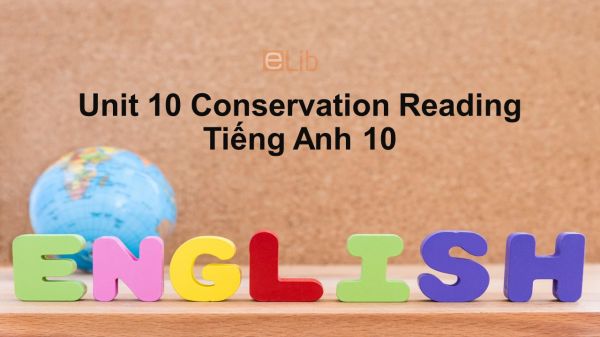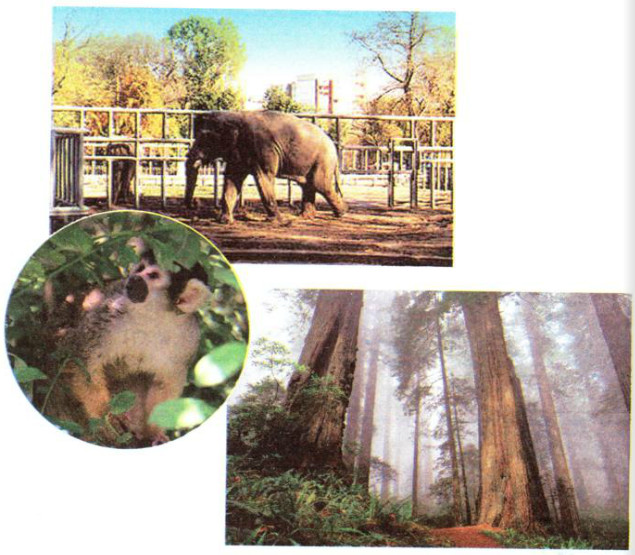Unit 10 lớp 10: Conservation-Reading
Unit 10 lớp 10 phần Reading giúp các em làm quen với kho từ vựng phong phú khi tìm hiểu về sự suy giảm của động vật quý hiếm cũng như việc bảo tồn tài nguyên thiên nhiên nói chung trong tương lai. Bên cạnh đó, các em còn giải quyết các dạng bài tập đúng sai, đoán nghĩa của từ mới qua ngữ cảnh và chọn ý chính cho mỗi đoạn văn được đề cập trong bài đọc.
Mục lục nội dung

Unit 10 lớp 10: Conservation-Reading
1. Before You Read Unit 10 lớp 10
Look at the pictures, and then answer the questions (Nhìn vào các hình, và sau đó trả lời các câu hỏi)
Guide to answer
1. Have you ever visited a zoo or a forest? (Bạn đã bao giờ đến thăm một vườn thú hay một khu rừng chưa?)
⇒ Yes. When I was a little girl, I went to the zoo with my parents. (Có chứ. Khi tôi còn nhỏ, tôi đi đến sở thú với ba mẹ của mình.)
2. What animals are you interested in? (Why? Bạn thích thú vật gì? Tại sao?)
⇒ I like rabbits best because they are so nice. (Tôi thích thỏ nhất vì chúng rất đáng yêu.)
3. Do you need to protect animals forests? (Bạn có cần bảo vệ rừng động vật không?)
⇒ Of course, yes. Because some animals are at risk of being extinct. (Tất nhiên là có rồi. Bởi vì một vài con vật đang có nguy cơ bị tuyệt chủng.)
2. While You Read Unit 10 lớp 10
Read the paragraphs, and then do the tasks that follows (Đọc các đoạn văn, và sau đó làm bài tập theo sau)
A. The loss of forest is destroying the earth’s plant and animal variety. Scientists say about 5,000 species of plants and animals are eliminated each year. This is especially worrying as many of those plants and animals could be used as medicines against cancer, AIDS, heart disease and many other sicknesses. We may never know the true cost of this destruction.
B. Man and most animals need a constant supply of water to live. Farmers need water for their crops. Hydroelectric dams hold back needed water and provide power for homes and industries. Frees, grasses, and other plant life play an important part in the natural circulation of water, and thus help conserve it. Without plants, most water would run off as soon as it falls, taking away valuable soil. Rapid run-off would cause frequent Hoods and leave little water during dry seasons.
C. These days it is impossible to open a newspaper without reading about the damage we are doing to the environment. The earth is being threatened and the future looks bad. What can each of us do? We cannot clean up our polluted rivers and seas overnight. Nor can we stop the disappearance of plants and animals. But we can stop worsening the problem while scientists search for answers, and laws are passed in nature's defence.
Tạm dịch
A. Sự suy thoái rừng đang tàn phá sự đa dạng động thực vật của trái đất. Các nhà khoa học cho biết rằng mỗi năm khoảng 5.000 chủng loại động thực vật bị mất đi. Điều này đặc biệt gây lo lắng vì nhiều động thực vật đó có thể được dùng làm thuốc trị ung thư, AIDS, bệnh tim và nhiều bệnh khác. Chúng ta có lẽ không bao giờ biết cái giá thật sự của sự tàn phá này.
B. Con người và phần lớn động vật cần một lượng nước ổn định để sống. Nông dân cần nước cho mùa vụ của họ. Các đập thủy điện giữ nước cần thiết và cung cấp điện cho gia đình và công nghiệp. Cây, cỏ và sự sống thực vật khác giữ một phần quan trọng trong sự tuần hoàn nước trong thiên nhiên, và do đó giúp bảo vệ nó. Không có cây cỏ, phần lớn nước sẽ chảy đi vừa khi nó đổ xuống, mang đi lớp đất quý giá. Nước chảy nhanh sẽ gây ra lụt thường xuyên và giữ lại ít nước trong mùa khô.
C. Trong những ngày không thể mở một tờ báo mà không đọc về thiệt hại chúng ta đang gây ra cho môi trường. Trái đất đang bị đe dọa và tương lai có vẻ xấu đi. Mỗi người chúng ta có thể làm gì? Chúng ta không thể dọn dẹp các sông và biển bị ô nhiễm của chúng ta chỉ qua một đêm. Chúng ta cũng không thể ngăn chặn sự biến mất cùa các động thực vật. Nhưng chúng ta có thể ngăn chặn vấn đề này dần tệ hơn trong khi các nhà khoa học nghiên cứu câu trả lời, và những luật được thông qua trong việc bảo vệ thiên nhiên.
2.1. Task 1 Unit 10 lớp 10
Match the word in A with a suitable definition in B (Ghép từ ở A với định nghĩa phù hợp ở B)
Guide to answer
1. c 2. a 3. d 4. b
Tạm dịch
1. Loại trừ: loại bỏ hoặc thoát khỏi hoàn toàn
2. Chu kỳ: sự chuyển động của một thứ gì đó xung quanh một hệ thống khép kín
3. Rửa trôi: chất lỏng chảy ra hoặc từ (một cái gì đó)
4. Thủy điện: liên quan hoặc sản xuất điện bằng sức mạnh của nước chảy
2.2. Task 2 Unit 10 lớp 10
Decide whether the following statements are true (T) or false (F) (Quyết định những câu sau đúng(T) hay sai (F))
T F

 1. Each year about fifty hundred species of plants and animals are eliminated. (Mỗi năm khoảng năm mươi trăm loài thực vật và động vật bị loại bỏ.)
1. Each year about fifty hundred species of plants and animals are eliminated. (Mỗi năm khoảng năm mươi trăm loài thực vật và động vật bị loại bỏ.)

 2. Many kinds of plants could be used to treat various dangerous diseases. (Nhiều loại thực vật có thể được sử dụng để điều trị các bệnh nguy hiểm khác nhau.)
2. Many kinds of plants could be used to treat various dangerous diseases. (Nhiều loại thực vật có thể được sử dụng để điều trị các bệnh nguy hiểm khác nhau.)

 3. Water can be held on land by vegetation. (Nước có thể được giữ trên đất bằng thảm thực vật.)
3. Water can be held on land by vegetation. (Nước có thể được giữ trên đất bằng thảm thực vật.)

 4. Man is constantly doing harm to the environment. (Con người liên tục làm hại đến môi trường.)
4. Man is constantly doing harm to the environment. (Con người liên tục làm hại đến môi trường.)

 5. Plants may cause floods and erosion. (Cây có thể gây lũ lụt và xói lở.)
5. Plants may cause floods and erosion. (Cây có thể gây lũ lụt và xói lở.)

 6. We can do nothing to save the earth. (Chúng ta không thể làm gì để cứu trái đất.)
6. We can do nothing to save the earth. (Chúng ta không thể làm gì để cứu trái đất.)
Guide to answer
1. T
2. T
3. T
4. T
5. F
6. F
2.3. Task 3 Unit 10 lớp 10
Choose the most suitable main idea for each paragraph (Chọn đại ý phù hợp nhất cho một đoạn văn)
1. We cannot live without water. (Chúng ta không thể sống mà không có nước.)
2. Let’s do something to save the earth. (Hãy làm một cái gì đó để cứu trái đất.)
3. Forests give us a lot of valuable things. (Rừng cho chúng ta rất nhiều thứ quý giá.)
4. Vegetation can help conserve water. (Thảm thực vật có thể giúp bảo tồn nước.)
Guide to answer
A. 3
B. 4
C. 2
3. After You Read Unit 10 lớp 10
Answer the following questions (Trả lời các câu hỏi sau)
1. What is the consequence of losing forest? (Hậu quả của việc mất rừng là gì?)
2. How important is water in our life? (Nước trong cuộc sống của chúng ta quan trọng như thế nào?)
3. What should we do for the future of our planet? (Chúng ta nên làm gì cho tương lai của hành tinh chúng ta?)
Guide to answer
1. The loss of forest is destroying the earth’s plant and animal variety. And this loss may bring about serious damage to man and other different animals: frequent floods, poor land, natural habitat and severe weather. (Việc mất rừng đang phá hủy sự đa dạng của thực vật và động vật của trái đất. Và sự mất mát này có thể gây ra thiệt hại nghiêm trọng cho con người và các động vật khác nhau: lũ lụt thường xuyên, đất nghèo nàn, môi trường sống tự nhiên và thời tiết khắc nghiệt.)
2. Water plays a very important role in living beings' life. Without water, no living thing on the earth could survive. For example we need water to grow our food, keep animals and fowls in our homes and produce power. (Nước đóng một vai trò rất quan trọng trong cuộc sống của con người. Không có nước, không có sinh vật sống trên trái đất có thể tồn tại. Ví dụ chúng ta cần nước để trồng thức ăn, nuôi động vật và gia cầm trong nhà và tạo ra sức mạnh.)
3. We should stop and prevent doing what can do serious damage to our environment by conserving rare plants and animals and by stopping the pollution of all kinds: air, water and land. (Chúng ta nên dừng lại và ngăn chặn những gì có thể làm phá hoại nghiêm trọng đến môi trường của chúng ta bằng cách bảo tồn thực vật và động vật quý hiếm và bằng cách ngăn chặn sự ô nhiễm của tất cả các loại: không khí, nước và đất.)
4. Practice
4.1. Reading comprehension
Read the passage carefully, then choose the correct answers (Đọc bài cẩn thận và chọn câu trả lời đúng)
Wild animals (and wild plants) and the wild places where they live are seriously threatened almost everywhere. One species has become extinct in each year of this century. But many hundreds are now in danger. Lack of attention would lead to the rapid advance of the process of extinction.
Already many kinds of wild animals has been so reduced in number that their role in the ecosystem is forgotten. Animals like the great apes, the whales, seals etc. thought to be in danger of extinction.
But even more important, perhaps than individual kinds of animals and plants, whole habitats are in danger of vanishing: marshes are being drained, and the world forests, especially tropical forests are being cut down to satisfy man’s needs of timber and paper.
What would our world be like if all the wild animals and wild plants vanished? - Would our life still exist then?
1. What would happen to the human beings if the wild life vanished?
A. Many species would quickly become extinct.
B. Tropical forests would be cut down.
C. The human life would be seriously threatened.
D. Species would go on dying out.
2. What is more important than individual kinds of animals and plants?
A. The vanishing of whole habitats.
B. The extinction of many species.
C. The rapid advance of the process of extinction.
D. Man’s need of timber and paper
3. What does the writer caution us against?
A. cutting down the tropical forests.
B. hunting wild animals.
C. draining marshes.
D. destroying our environment.
4. What would happen if we cut down forests?
⇒ Cutting down forests would cause ……………..
A. the changes of temperature.
B. the flood
C. both A and B are correct.
D. none are correct.
5. “To threaten” in the passage means …………..
A. to pollute
B. to vanish
C. to give fear to
D. to poison
4.2. Multiple-choice
Để nâng cao kĩ năng đọc hiểu với chủ đề "Conservation", mời các em cùng đến với phần trắc nghiệm Unit 10 Reading Tiếng Anh 10 và cùng luyện tập.
5. Conclusion
Qua bài học này các em cần ghi nhớ các từ vựng quan trọng như sau
- leopard (n) ['lepəd]: con báo
- eliminate (v) [i'limineit]: hủy diệt
- cancer (n) ['kænsə]: ung thư
- heart disease (n) [hɑ:t, di'zi:z]: bệnh tim
- hydroelectric (adj) [,haidroui'lektrik]: thủy điện
- dam (n) [dæm]: đập nước
- circulation (n) [,sə:kju'lei∫n] : sự tuần hoàn
- conserve (v) [kən'sə:v]: giữ lại
- frequent (adj) ['fri:kwənt]: thường xuyên
- flood (n) [flʌd]: lũ,lụt
- damage (n) ['dæmidʒ]: sự thiệt hại
- flexible (adj) ['fleksəbl]: linh họat, dễ sai khiến
- power of falling ['fɔ:liη] water: năng lượng dòng chảy
- get rid of (exp.): tống khứ
- vegetation (n) [,vedʒi'tei∫n]: cây trồng
- erosion (n) [i'rouʒn]: sự xói mòn
- rapid (adj) ['ræpid]: nhanh chóng
- disappearance (n) [,disə'piərəns]: sự biến mất
- concern (v) [kən'sə:n]: quan tâm đến



